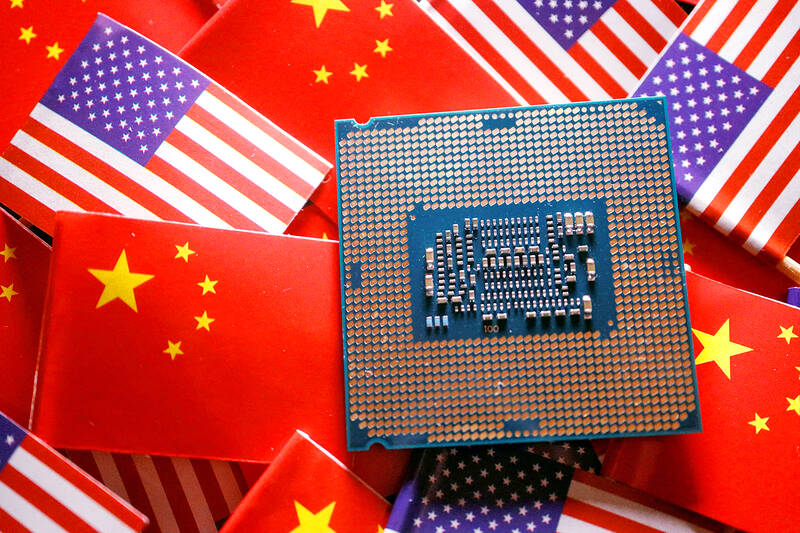US President Joe Biden’s administration on Monday said it is finalizing rules that would limit US investments in artificial intelligence (AI) and other technology sectors in China that could threaten US national security.
The rules, which were proposed in June by the US Department of the Treasury, were directed by an executive order signed by Biden in August last year covering three key sectors: semiconductors and microelectronics, quantum information technologies and certain AI systems.
The rules are to take effect on Jan. 2 next year and would be overseen by the Treasury’s newly created Office of Global Transactions.

Photo: Reuters
The Treasury said the “narrow set of technologies is core to the next generation of military, cybersecurity, surveillance and intelligence applications.”
The rules cover technologies such as “cutting-edge code-breaking computer systems or next-generation fighter jets,” US Assistant Secretary of the Treasury for Investment Security Paul Rosen said.
“US investments, including the intangible benefits like managerial assistance and access to investment and talent networks that often accompany such capital flows, must not be used to help countries of concern develop their military, intelligence and cyber capabilities,” he added.
The move is part of a broader push to prevent US know-how from helping China develop sophisticated technology and dominate global markets.
US Secretary of Commerce Gina Raimondo earlier this year said that the rules were crucial to prevent China from developing military-related technologies.
The new rules contain a carve-out allowing US investment in publicly traded securities, but the officials said the US already has authorities under a previous executive order barring buying and selling of securities of certain designated Chinese companies.
The US House of Representatives Select Committee on Strategic Competition between the US and the Chinese Communist Party has criticized major US index providers for directing billions of dollars from US investors into stocks of Chinese companies that the US believes are facilitating the development of China’s military.
The select committee has also urged the US Department of Commerce to examine national security threats from China’s development of silicon photonics technology, a fast-developing field that could speed up AI.
At its core, silicon photonics relies on light, rather than electrical signals, to move information inside of computer systems and has uses in AI systems where tens of thousands of computer chips are connected.
“The dual-use nature of photonics technology makes it particularly susceptible to military end-use diversion by problematic actors,” US representatives John Moolenaar and Raja Krishnamoorthi wrote in their letter on Monday.
“We’ve received the letter and will respond through the appropriate channels,” a commerce department spokesperson said.
China has been aggressively pursuing the technology, with Guangdong Province in the past few weeks joining a spate of funding programs aimed at building photonics chips in China, state media said.
“China has been perhaps the quickest state actor to mobilize the resources and encourage local and regional governments to work on photonic technology,” said Sunny Cheung (張崑陽), an associate fellow for China studies with the Jamestown Foundation who has studied China’s efforts in the field.

Taiwan Semiconductor Manufacturing Co (TSMC, 台積電) last week recorded an increase in the number of shareholders to the highest in almost eight months, despite its share price falling 3.38 percent from the previous week, Taiwan Stock Exchange data released on Saturday showed. As of Friday, TSMC had 1.88 million shareholders, the most since the week of April 25 and an increase of 31,870 from the previous week, the data showed. The number of shareholders jumped despite a drop of NT$50 (US$1.59), or 3.38 percent, in TSMC’s share price from a week earlier to NT$1,430, as investors took profits from their earlier gains

In a high-security Shenzhen laboratory, Chinese scientists have built what Washington has spent years trying to prevent: a prototype of a machine capable of producing the cutting-edge semiconductor chips that power artificial intelligence (AI), smartphones and weapons central to Western military dominance, Reuters has learned. Completed early this year and undergoing testing, the prototype fills nearly an entire factory floor. It was built by a team of former engineers from Dutch semiconductor giant ASML who reverse-engineered the company’s extreme ultraviolet lithography (EUV) machines, according to two people with knowledge of the project. EUV machines sit at the heart of a technological Cold

TAIWAN VALUE CHAIN: Foxtron is to fully own Luxgen following the transaction and it plans to launch a new electric model, the Foxtron Bria, in Taiwan next year Yulon Motor Co (裕隆汽車) yesterday said that its board of directors approved the disposal of its electric vehicle (EV) unit, Luxgen Motor Co (納智捷汽車), to Foxtron Vehicle Technologies Co (鴻華先進) for NT$787.6 million (US$24.98 million). Foxtron, a half-half joint venture between Yulon affiliate Hua-Chuang Automobile Information Technical Center Co (華創車電) and Hon Hai Precision Industry Co (鴻海精密), expects to wrap up the deal in the first quarter of next year. Foxtron would fully own Luxgen following the transaction, including five car distributing companies, outlets and all employees. The deal is subject to the approval of the Fair Trade Commission, Foxtron said. “Foxtron will be

INFLATION CONSIDERATION: The BOJ governor said that it would ‘keep making appropriate decisions’ and would adjust depending on the economy and prices The Bank of Japan (BOJ) yesterday raised its benchmark interest rate to the highest in 30 years and said more increases are in the pipeline if conditions allow, in a sign of growing conviction that it can attain the stable inflation target it has pursued for more than a decade. Bank of Japan Governor Kazuo Ueda’s policy board increased the rate by 0.2 percentage points to 0.75 percent, in a unanimous decision, the bank said in a statement. The central bank cited the rising likelihood of its economic outlook being realized. The rate change was expected by all 50 economists surveyed by Bloomberg. The